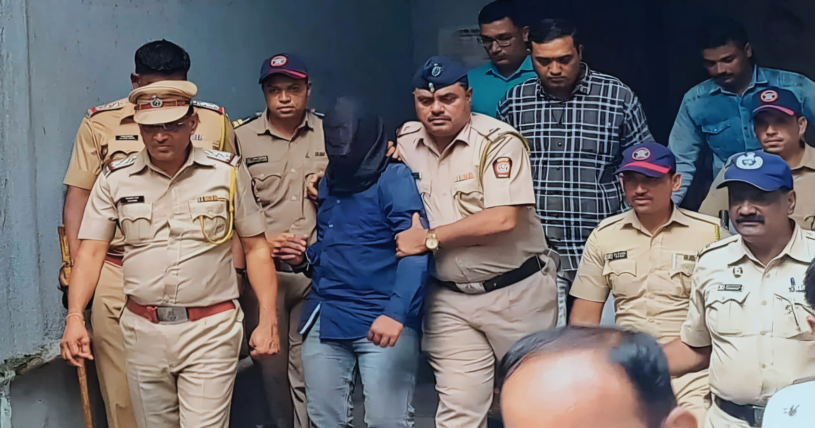Badlapur sexual assault accused killed in Encounter
On Monday, September 23, 2024, Thane police in Maharashtra shot and killed Akshay Shinde, who was accused of sexually assaulting two minors at a school in Badlapur town. According to the police, Shinde had grabbed a gun from one of the officers and fired at them.

The Thane crime branch police arrived at Taloja jail at 5:30 PM to take custody of 24-year-old Mr. Shinde, who is implicated in a new sexual assault case initiated by his wife. A team of around 10 policemen was escorting him from the jail in a police vehicle, with four armed officers seated next to him, Upon reaching the Mumbra bypass road at approximately 6:30 PM, Shinde allegedly snatched the pistol of assistant police inspector Nilesh More and fired three rounds at him, one of which hit him in the thigh.
In response, senior inspector Sanjay Shinde fired one round at Akshay Shinde, which struck him in the head. Shinde was transported to Chhatrapati Shivaji Maharaj Hospital in Kalwa. On Monday evening, Shinde's body was moved to JJ Hospital in Mumbai for a post-mortem examination.
Mother Disputes Police Claims
Alka Shinde, the mother of Akshay Shinde, has strongly disputed the claims made by the Thane police. She alleged that her son's death was orchestrated by certain political figures. "My son was afraid of Diwali firecrackers. I would always drop him off at school or work during that time because he was scared of the noise. It's hard to believe he would take a gun and fire shots," she said.
She emphasized that her son had consistently denied the crimes. "Even if he had committed the crimes, the government and police should trust their own investigation and have the courage to handle this case impartially. A fair punishment, even if it were the death penalty, would have been acceptable. But this situation is more serious; my son wasn't even given a chance to defend himself. Akshay is innocent, and I will fight for his justice," she stated.
Special Investigative Team
A Special Investigative Team, headed by senior IPS officer Arti Singh, was appointed by the Maharashtra government to swiftly address the case. Investigated sexual assaults on two young girls at a school. The SIT charged the school principal, chairman, and secretary with negligence for failing to report the incidents and the police for not taking prompt action. The perpetrator was charged with sexual assault, and medical reports confirmed severe physical injuries to the victims.
What is Extrajudicial Killing?
Extrajudicial Killing refers to the unlawful killing of a person by state agents without judicial proceedings. This means individuals are killed without a trial, due process, or legal justification. Such killings often occur in the context of law enforcement operations, where the accused are labeled as dangerous criminals, such as terrorists or gangsters.
What are the Constitutional Provisions?
Right to Life (Article 21): The Constitution of India guarantees the right to life and personal liberty, which prohibits arbitrary deprivation of life by the state.
Rule of Law: The Constitution establishes the rule of law as a fundamental principle, ensuring that everyone is subject to the law and that justice is administered impartially.
Due Process: The legal framework ensures that all individuals, including those accused of crimes, are entitled to fair legal proceedings.
Rights of Police
The police have specific rights and responsibilities under the law:
Use of Force: Police can use reasonable force to maintain law and order, as per Sections 96 and 46 of the Indian Penal Code (IPC) and Criminal Procedure Code (CrPC). This includes the right to use lethal force under certain circumstances, such as self-defense or preventing serious crimes.
Investigative Authority: Police have the authority to conduct investigations, gather evidence, and make arrests in accordance with legal provisions.
Guidelines Related to Encounters in India
In 2014, the Supreme Court of India issued guidelines to regulate police encounters, especially in cases resulting in death. Key points include:
Mandatory FIR: An FIR must be registered for any death resulting from police action.
Independent Investigation: Investigations must be conducted by an independent agency, such as the Criminal Investigation Department (CID).
Magisterial Inquiry: A magisterial inquiry is mandatory for all encounter deaths to ensure accountability.
Timely Reporting: The National Human Rights Commission (NHRC) and relevant authorities must be informed of encounter deaths without delay.
Documentation: Written records of intelligence inputs and actions taken must be maintained.
Compensation: There should be provisions for compensation for the families of victims in cases of wrongful killings.
Laws Relating to Encounters
Indian Penal Code (IPC):
Section 300: Defines murder, which includes unlawful killings without legal justification.
Section 46: Allows police to use necessary force, even lethal, in certain situations during arrests.
Criminal Procedure Code (CrPC):
Section 96: Justifies the use of force in self-defense.
Supreme Court Guidelines:
The 16-point guidelines established by the Supreme Court aim to regulate police conduct during encounters and ensure accountability.
National Human Rights Commission (NHRC):
The NHRC has issued its own guidelines to monitor and report on police encounters, emphasizing the need for transparency and accountability.
What if the Encounter Killings are Fake?
If encounter killings are found to be fake or premeditated, they raise serious legal and ethical concerns :
Misuse of Power: Such actions could signify a misuse of state power and violate the rights of individuals.
Legal Consequences: Police officers involved may face criminal charges, disciplinary actions, or civil liabilities.
Loss of Trust: Fake encounters can erode public trust in law enforcement and the judicial system, leading to a perception of lawlessness.
Conclusion
Extrajudicial killings undermine the rule of law and violate fundamental human rights. The legal framework in India provides protections and guidelines to prevent such abuses, ensuring that even those accused of serious crimes are afforded due process and the right to life. Proper adherence to these laws and guidelines is crucial for maintaining public trust in law enforcement and the justice system.
